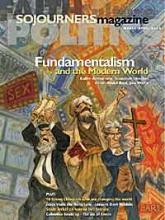It's long had a bad reputation, but fundamentalism has become an especially dirty word since Sept. 11. But does fundamentalism necessarily equal violence? Four experts on the subject, from all three Abrahamic traditions, gathered at the Cathedral of St. John the Divine in New York City on Nov. 17 for a conversation on the religious and political roots in Christianity, Judaism, and Islam.
Karen Armstrong: Fundamentalism has erupted in every single major faith worldwide, not just in the Islamic world. The term "fundamentalism" was coined here in the United States, at the turn of the 20th century, when Protestant Christians said that they wanted to go back to the fundamentals of their faith. Sometimes Jews and Muslims, understandably, find it slightly offensive to have this Christian term foisted upon them, because they feel they have other objectives. It also suggests that fundamentalism is a kind of monolithic movement expressing the same kind of ideas and ideals.
Nevertheless, the term has come into popular parlance and tends to stand for a group of militant pieties that have erupted in every single major faith worldwide during the 20th century, first in Protestant fundamentalism. But also we have fundamentalist Judaism, Islam, Sikhism, Confucianism, Hinduism.
Fundamentalism is not simply extremism. Fundamentalism is not simply conservatism. Billy Graham, for example, would not be accepted as a fundamentalist by those who call themselves fundamentalists, nor would he call himself one. The Saudis, in Saudi Arabia, may be traditionalists but they're not, strictly speaking, fundamentalists.
Read the Full Article

